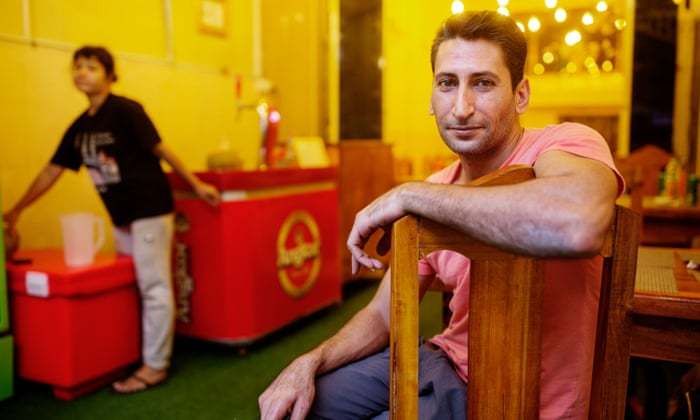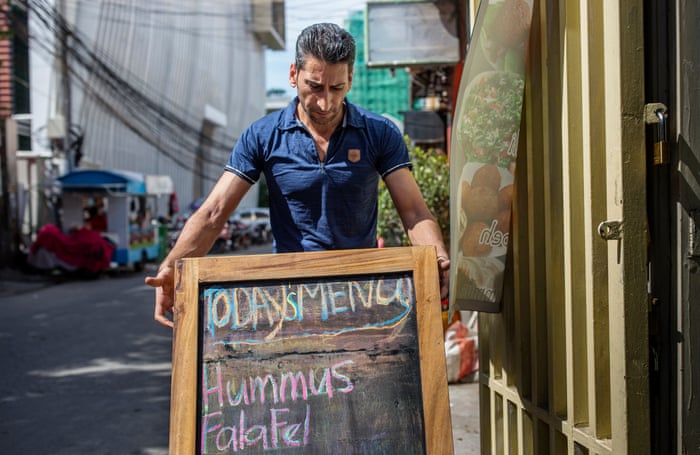
 |
| Since arriving in Cambodia in 2016, Abdullah has opened a restaurant and is trying to put a ‘hellish’ chapter of his life behind him. Photograph: Jonas Gratzer |
'I need my family': how a refugee held on Nauru is struggling to make a new life in Cambodia
Abdullah hoped that moving to Cambodia under Australia’s refugee deal would allow him to be reunited with his family. But that has not happened
The Guardian | 13 January 2018
Abdullah leans against a scooter on a Phnom Penh backstreet and blows kisses into his smartphone.
“Be patient, soon we’ll be together again,” he tells the video image of his wife and three children. But as soon as he hangs up his smile flickers away. He was detained for two-and-a-half years in an Australian-run detention centre on the island nation of Nauru and hoped that moving to Cambodia would enable him to be reunited with his family. That has not happened.
Since he arrived in Cambodia in November 2016, he has settled down in the capital, opened a restaurant, started working out and looks ready to put a “hellish” chapter of his life behind him. Still, the prolonged insecurity weighs heavy on his already frail nerves.
“I think I can have a good life in Cambodia,” he says. “But without my family I’m just drifting along, with no real control of my life.”
Cambodia’s agreement to take refugees from Australian-run detention centres predates Australia’s deal with the US – the one agreed by the Obama administration that Donald Trump protested against. In 2014, Australia and Cambodia reached a $55m deal to transfer people whose refugee status had been determined. Three-and-a-half years later, only seven detainees have taken up the offer. Four of them left Cambodia within a year. Abdullah is focused on making Cambodia his home.
For his first four months in Cambodia he stayed in a compound run by the International Organisation for Migration mission in the country. There he was taught about Cambodian culture and language. After that he got his own place from where he could roam around, get to know the locals and find a good place to set up his restaurant.
He opened his restaurant in August. It took only a month to get his licence and his suppliers agreed to give him a few months to get started before they would expect repayments.
“My children have all grown up without me being there,” he says. “I can’t understand how that’s happened. Our relationship is the same but my life is radically different.
“I didn’t see any other solution than Cambodia. We had several meetings where we discussed different offers. My only condition was that they bring my family. Now it’s taken over a year and they’re still telling me to wait, without giving me any reason why. I can’t understand why Australia is doing this to me.
“I can have a good life in Cambodia but I need my family.”
Arranging for his family to come a considerable challenge for Abdullah to undertake on his own. Neither his wife nor children have passports and war is tearing up their home country of Syria. That is why they fled in the first place. From a neighbouring country (details are being withheld at Abdullah’s request), Abdullah went on, in search of a safer existence, leaving in early 2013.
“When people told me about the journey to Australia I thought they were joking,” he says. “My brother lives there but he arrived the regular way. Travelling by boat without a visa sounded crazy.”
After a terrifying journey and half a year’s detention on Christmas Island, Abdullah was transferred to Nauru. There, crowded tents awaited under a scorching sun. Time ground to a halt.
“Everybody got pills to silence their minds and to sleep,” he says. “But at night I heard people trying to hang themselves. Two times I saw people burn to death. They said they were going to do it beforehand but the employees didn’t care.”
On a calm Phnom Penh morning, Abdullah prepares a plate of hummus with minced meat. His movements in the kitchen are measured and experienced. Back in Daraa, in Syria, he used to be a baker. Now, with the help of private loans and aid from the Australian government, he has opened a Middle Eastern restaurant right next to a stretch of hip expatriate bars. It is off to a good start, even though someone started spreading malicious rumours he was actually an ex-inmate of Guantánamo Bay.
But challenges like that pale in comparison to what he has been through. “I honestly don’t know how I made it through Nauru,” he says.


No comments:
Post a Comment